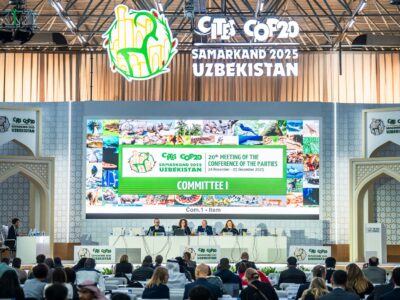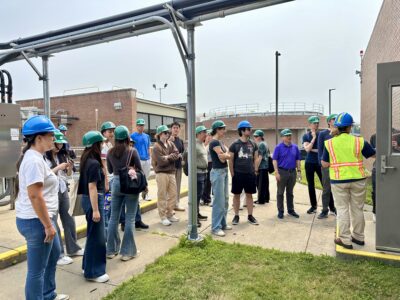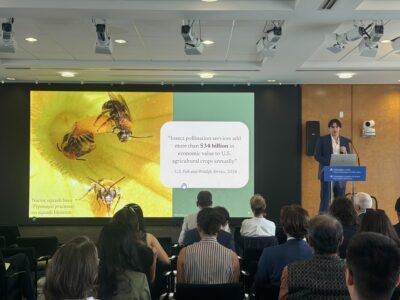 For Carolina Rosero, the MPA in Environmental Science and Policy program will provide the tools she needs to bridge the gap between scientists and decision-makers. She hopes to combine the skills she gained through her job in Ecuador’s Ministry of Environment with her coursework at Columbia to make an impact in developing nations.
For Carolina Rosero, the MPA in Environmental Science and Policy program will provide the tools she needs to bridge the gap between scientists and decision-makers. She hopes to combine the skills she gained through her job in Ecuador’s Ministry of Environment with her coursework at Columbia to make an impact in developing nations.
1. What drew you to the Master of Public Administration in Environmental Science and Policy program (MPA-ESP)?
For me, one of the most attractive points of SIPA’s MPA in Environmental Science and Policy is the focus that the program gives to understanding the science behind the environmental issues and how these can be translated into policy-making decisions and program implementation. There continues to be a gap between scientists and decision-makers in public policy and there is a unique opportunity to make substantial changes by making that link. Another attractive selling point of the program is the condensed, and intensive, one-year format that is optimal for someone like me who does not want to take a two-year hiatus from her career. Finally, the opportunity to attain a degree from a university as prestigious as Columbia was something that I could not pass up.
2. What were you doing before you started the program?
Before starting the program, I was working in Ecuador’s Ministry of Environment as the Conservation Coordinator for Socio Bosque, an innovative national government incentive program. Socio Bosque is currently conserving more than 1.4 million hectares of native ecosystems nation-wide and benefiting more than 170,000 people. My former job allowed me to work in every aspect of policy design and program implementation: trudging through the Amazon and hiking through the highlands, working with more than 160 indigenous and rural communities, negotiating with government authorities, and collaborating with international stakeholders. I also participated in meetings and preparations in developing the REDD+ Program in Ecuador.
3. What area of environmental policy and management are you most interested in?
I’m interested in policies and programs that work at the interface of natural resource management and livelihood improvement in developing countries. I believe that sustainable development can only be achieved by maintaining healthy ecosystems and biodiversity, something that requires successful forest governance that can align conservation practices with human rights and poverty alleviation.
4. What skills and tools do you hope to acquire through the program?
Because my academic background is in social sciences, I gained invaluable insight and understanding of the earth sciences, interpreting key information, asking key questions to develop solutions to multi-disciplinary problems. By far, one of the biggest challenges and best tools to have is interpreting scientific information and communicating that information effectively in order to implement systems-based policies based on scientific evidence.
5. What is your favorite class in the MPA-ESP program so far, and why?
One of my favorite classes in the program was Climatology. It was one of the most difficult and science intensive courses that we took over the summer. While I felt that I struggled through the material because it was so fast-paced, in retrospect I can see how much information I retained and how effective the assignments were in forcing us to look at the data, analyze it and understand what implications the data has for real-world application. It provided the tools needed to understanding the science behind climate change, which will undoubtedly be a large component of my work in the future.
6. How has collaborating with your fellow students in class projects benefited you professionally and personally?
One of the best aspects of this program is the team-based approach to learning. By consistently working in teams of all sizes, I have learned more about my own strengths and weaknesses in group settings and in meeting tight deadlines. I also learned how to engage with peers who come from different backgrounds, specialties and cultural experiences, and how to collaborate in harnessing the different strengths that each person brings to the table.
After having experience in the workforce, I can honestly say that the group projects in Workshop have been a great real-world simulation of working in teams and with clients. And, no matter how many years of experience one has, this is a great exercise both professionally and personally. The people in this program will not only be my colleagues throughout my career but have also become great friends.
7. Beyond the classroom, what, if any, extracurricular sustainability-related activities have you engaged in with your fellow Environmental Science and Policy students?
Currently, I am a volunteer coordinator at New York Women Social Entrepreneurs (NYWSE), a nonprofit organization that engages social entrepreneurs in becoming business leaders, practical visionaries and sustainability experts. Together with a few other women in our program, we have been working to incorporate a Sustainability Series to bring interdisciplinary speakers and explore issues and potential remedies related to energy, the environment, and creating a sustainable society for all. Being a part of this organization has allowed me to not only work towards sustainability and environmental issues in a different setting outside my own field, but it has also forged and strengthened relationships with brilliant, passionate and progressive women in our program and in the field.
8. How do you intend to utilize your degree from the MPA-ESP program to further your career?
The degree from the MPA-ESP program will complement my MSc in Gender and Development and allow me to work in a field that links environmental issues with livelihood improvement in developing countries. I have no doubt that I will continue to reach out to the network of ESP alumni whether I’m working in the Ecuadorean government or in international organizations that address these issues.
****
Students in the MPA in Environmental Science and Policy program enroll in a year-long, 54-credit program offered at Columbia University’s School of International and Public Affairs, in partnership with the Earth Institute.
Since it began in 2002, the MPA in Environmental Science and Policy program has given students the hands-on experience, and the analytical and decision-making tools to implement effective environmental and sustainable management policies. The program’s 682 graduates have advanced to jobs in domestic and international environmental policy, working in government, private and non-profit sectors. Their work involves issues of sustainability, resource use and global change, in fields focused on air, water, climate, energy efficiency, food, agriculture, transportation and waste management. They work as consultants, advisers, project managers, program directors, policy analysts, teachers, researchers and environmental scientists and engineers.
Visit our website for more information: http://mpaenvironment.ei.columbia.edu/
Learn more about our Master of Public Administration in Environmental Science and Policy Program.
Subscribe to the MPA Environmental Science and Policy Newsletter



